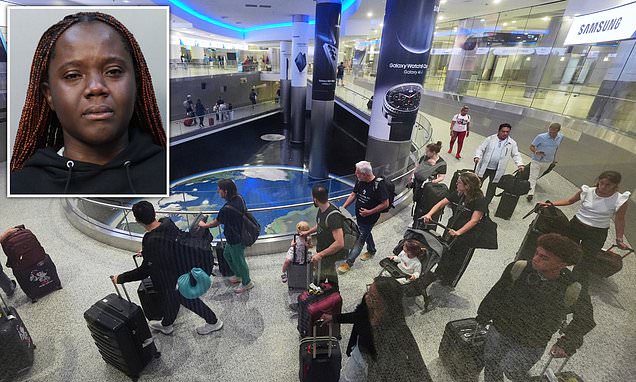On September 2, 2025, Miami International Airport became the scene of a shocking incident that captured international attention, as a 23-year-old British tourist, Alvina Omisiri Agba, was arrested for allegedly attempting to abduct a four-year-old boy from his mother at a security checkpoint. The incident, first reported by the Daily Mail and corroborated by multiple sources including the Miami-Dade Sheriff’s Office, unfolded in the early hours of the morning, plunging the busy airport into chaos and raising serious questions about security protocols, mental health, and the safety of travelers. Agba, hailing from Luton, England, faces charges of interference with custody and battery, with a $3,500 bond set at the Turner Guilford Knight Correctional Center. This article provides a comprehensive examination of the incident, exploring Agba’s actions, the response from authorities and bystanders, the broader context of airport security, and the implications for international travel and public safety.
The Incident: A Mother’s Nightmare Unfolds
The incident occurred around 4 a.m. on Tuesday, September 2, 2025, at a bustling security checkpoint at Miami International Airport (MIA), one of the busiest hubs in the United States, handling over 52 million passengers annually. According to an arrest report from the Miami-Dade Sheriff’s Office, obtained by outlets like the Miami Herald and Fox News, the situation began when Nadine Joseph, the mother of a four-year-old boy, was standing in line at the check-in counter. Her son was visibly upset, crying as they navigated the crowded terminal. Alvina Omisiri Agba, a 23-year-old British tourist, approached Joseph and offered to help soothe the child, a gesture that initially appeared kind-hearted.
Joseph, likely exhausted and distracted by the demands of traveling with a young child, agreed to let Agba hold her son. This decision, made in a moment of trust, quickly turned into a nightmare. As soon as Agba took the child, she walked away from the check-in line, moving out of Joseph’s sight. According to the arrest report, Joseph immediately pursued Agba, tracking her down to find her sitting on the floor with the boy. When Joseph demanded her son’s return, Agba allegedly responded with a chilling declaration: “No, this is my child.”
What followed was a harrowing confrontation. Agba reportedly wrapped her arms and legs around the four-year-old, preventing him from moving or escaping her grasp. When Joseph attempted to retrieve her son, Agba allegedly pushed her away, escalating the situation into a physical struggle. The arrest report details a distressing scene where Joseph grabbed her son’s arms while Agba held onto his legs, resulting in a tug-of-war over the child in the middle of the airport terminal. The boy sustained deep scratches to his neck during the altercation, though he was ultimately deemed well enough to board his flight with his mother.
The commotion drew the attention of bystanders, including Naylet Montano, a GlobalX Air employee working at a nearby counter. Montano, a mother herself, intervened out of concern for the child’s safety. “I ran to see what was going on,” she told WSVN 7News through a translator. Montano took the boy behind a counter to protect him, prompting Agba to crawl under the counter and demand the child’s return, still insisting he was hers. Three unidentified men stepped in, forming a human barrier between Agba and Montano to prevent further attempts to seize the child. Airport staff promptly called 911, and Agba fled the scene, only to be apprehended by deputies at Checkpoint 5 within the airport.
During a post-Miranda interview, Agba offered a perplexing explanation for her actions. She claimed she was simply trying to calm the child by taking him to a wall painted with a rainbow, believing the colorful display would soothe him. She further stated that she could not recall what happened when Joseph confronted her, adding, “I only did it because God told me to do it.” Authorities confirmed that Agba was not under the influence of drugs or alcohol at the time, raising questions about her mental state and motivations.
Agba was charged with interference with custody and two counts of battery, reflecting the physical nature of her confrontation with Joseph and the harm caused to the child. As of September 2, 2025, she remained in custody at the Turner Guilford Knight Correctional Center, with a bond set at $3,500 (£2,600). The incident, which unfolded in a matter of minutes, left a lasting impact on those involved and sparked a broader conversation about safety, mental health, and accountability in public spaces.
Who Is Alvina Omisiri Agba?
Little is known about Alvina Omisiri Agba beyond the details provided in police reports and media coverage. Described as a 23-year-old from Luton, Bedfordshire, England, Agba was in the United States as a tourist at the time of the incident. Her background, motivations, and personal circumstances remain largely undisclosed, as the Daily Mail and other outlets focused primarily on the events at MIA. It is unclear whether Agba had any prior connection to the boy or his mother, Nadine Joseph, with multiple reports stating that their relationship, if any, remains unknown.
Agba’s claim that “God told her to do it” has raised speculation about her mental health, though no official diagnosis or psychological evaluation has been publicly reported. Her assertion that she intended to calm the child by showing him a rainbow-painted wall suggests a possible disconnect from the gravity of her actions, further fueling questions about her state of mind. The absence of drugs or alcohol in her system, as confirmed by authorities, eliminates substance use as a contributing factor, leaving mental health or ideological motivations as potential explanations.
Luton, Agba’s hometown, is a diverse, working-class town north of London with a significant immigrant population. While this context offers little insight into Agba’s personal life, it underscores the international dimension of the incident, as a British citizen’s actions in a U.S. airport have drawn scrutiny from media on both sides of the Atlantic. The lack of information about Agba’s background highlights a gap in the narrative, leaving room for speculation about what drove her to engage in such alarming behavior.
The Response: Authorities, Bystanders, and Airport Staff
The swift response from airport staff, bystanders, and law enforcement was critical in resolving the incident without further harm to the child. Naylet Montano’s intervention was particularly pivotal. As a GlobalX Air employee and a mother, Montano acted instinctively to protect the boy, taking him to safety behind a counter. Her actions, supported by three male bystanders who blocked Agba’s path, prevented a potentially more dangerous outcome. Montano’s statement to WSVN 7News reflected her maternal instincts: “Once I saw the child appearing to be in danger, I just wanted to do what I could to protect him.”
The Miami-Dade Sheriff’s Office responded promptly, apprehending Agba at another checkpoint within the airport. Their arrest report, cited by multiple outlets, provides a detailed account of the incident, emphasizing Agba’s physical resistance and the injuries sustained by the child. The decision to charge her with interference with custody and battery reflects the seriousness of her actions, which went beyond a momentary lapse in judgment to include physical aggression and refusal to comply with the mother’s demands.
Airport staff also played a crucial role. Dayanis Ojeda, a check-in desk supervisor, recounted the chaos to Local 10 News: “Once [my colleague] took the boy to the counter, the lady went inside the counter, and we called 911.” The quick decision to involve law enforcement ensured that the situation was contained before it escalated further. The presence of dedicated airport police, a standard feature at MIA, facilitated Agba’s apprehension and underscored the importance of robust security measures in high-traffic environments.
The Broader Context: Airport Security and Public Safety
The incident at Miami International Airport has prompted renewed scrutiny of airport security protocols, particularly regarding the safety of vulnerable travelers like children. MIA, which serves as a major gateway for international and domestic flights, employs a comprehensive security system, including TSA screenings and a dedicated police presence. However, the incident exposed potential vulnerabilities in crowded areas like check-in counters, where distractions and chaos can create opportunities for unpredictable behavior.
The Daily Mail and other sources, such as Archyde, noted that the incident has led to an immediate review of security measures at MIA. While TSA screenings focus primarily on baggage and passenger checks for prohibited items, incidents like this highlight the need for broader vigilance in public areas of the airport. The fact that Agba was able to walk away with the child, even briefly, raises questions about how airports can better monitor interactions between strangers and protect families in high-stress environments.
The role of bystanders, like Montano and the three men who intervened, underscores the importance of community vigilance in public spaces. Their quick thinking prevented a worse outcome, but it also highlights the reliance on civilians to fill gaps in security during unexpected incidents. The Miami-Dade Sheriff’s Office emphasized that the incident was resolved due to the combined efforts of staff, bystanders, and law enforcement, but it has sparked calls for enhanced training for airport personnel to recognize and respond to potential threats.
The case also draws attention to the broader issue of mental health in public spaces. Agba’s claim that “God told her to do it” suggests a possible psychological issue, though no official evaluation has been reported. Airports, as high-stress environments, can exacerbate mental health challenges, and incidents like this highlight the need for better resources to identify and support individuals who may pose a risk to others. The absence of drugs or alcohol in Agba’s system eliminates one potential factor, but it leaves open questions about how airports and authorities can address mental health crises without stigmatizing travelers.
The Legal and Social Implications
Agba’s arrest and charges carry significant legal consequences. In Florida, interference with custody is a serious offense, typically applied in cases where a person knowingly takes or entices a minor away from their legal guardian without consent. The charge can carry penalties of up to seven years in prison, depending on the circumstances. The two counts of battery, stemming from Agba’s alleged pushing of Joseph and the scratches sustained by the child, add further weight to the case. Battery in Florida can result in up to one year in jail per count, with fines and potential civil liabilities.
The Archyde report noted that legal experts suggest the severity of the charges could depend on Agba’s mental state and any pre-existing conditions. If a psychological evaluation reveals a mental health disorder, it could influence her defense, potentially leading to a plea for leniency or alternative sentencing. However, the public nature of the incident and the harm caused to the child make a strong case for prosecution, as authorities aim to deter similar behavior.
Socially, the incident has sparked widespread debate about trust, safety, and the vulnerability of children in public spaces. On platforms like X, users expressed outrage and sympathy for Joseph, with many sharing personal stories of traveling with young children. “This is every parent’s worst nightmare,” one user posted. “You let someone help for a second, and they try to take your kid.” Others questioned Agba’s motives, with some speculating about human trafficking concerns, though no evidence supports this theory. The incident has also fueled discussions about cultural differences in child-rearing and trust, as Agba’s British background and the international setting of MIA add layers of complexity to the narrative.
The Impact on the Family
For Nadine Joseph and her son, the incident was a traumatic ordeal. The Daily Mail reported that the boy sustained deep scratches to his neck, likely from the physical struggle between Agba and his mother. While he was deemed well enough to board his flight, the emotional toll on both mother and child is likely significant. The public nature of the incident, coupled with the physical injuries, could have lasting effects, particularly for a young child exposed to such a frightening experience.
Joseph’s quick response in pursuing Agba and demanding her son’s return demonstrates the fierce protectiveness of a parent, but it also highlights the vulnerability of families in busy public spaces. The fact that she was forced to physically wrestle for her child underscores the intensity of the confrontation and the failure of initial trust. The involvement of bystanders and airport staff likely mitigated further harm, but the incident serves as a stark reminder of the risks parents face when traveling with young children.
The Role of Media and Public Perception
The Daily Mail’s coverage, along with reports from Fox News, WSVN 7News, CBS Miami, and The Mirror, has shaped public perception of the incident. The use of terms like “chaos” and “snatched” in headlines emphasizes the dramatic nature of the event, while detailed accounts of Agba’s actions and statements have fueled speculation about her intentions. The Daily Mail’s framing of Agba as a “Brit tourist” highlights the international dimension, potentially amplifying scrutiny of foreign travelers in the U.S.
Media coverage has also drawn attention to the heroism of bystanders like Montano, whose actions have been widely praised. However, the lack of detailed information about Agba’s background or motives has led to gaps in the narrative, leaving room for public speculation. Some outlets, such as Birmingham Live, noted the scratches on the child’s neck and Agba’s claim about the rainbow wall, adding layers of complexity to the story that invite both sympathy and condemnation.
On social media, the incident has sparked debates about parental vigilance, airport safety, and the treatment of mental health issues. Hashtags like #MiamiAirportChaos and #ChildSafety trended briefly on X, reflecting public concern and outrage. The polarized nature of online discourse—ranging from calls for harsher penalties to questions about Agba’s mental state—mirrors broader societal tensions about crime, compassion, and accountability.
Lessons and Future Implications
The incident at Miami International Airport has far-reaching implications for airport security, mental health awareness, and public trust. For airports, it underscores the need for enhanced vigilance in public areas, particularly during peak travel times. Training programs for staff could include protocols for identifying and responding to suspicious behavior, while public awareness campaigns might encourage travelers to report concerns promptly.
From a mental health perspective, the incident highlights the importance of addressing potential crises in high-stress environments. While Agba’s claim that “God told her to do it” is not conclusive evidence of a mental health disorder, it suggests a need for better screening and support mechanisms for travelers who may be experiencing distress. Airports could partner with mental health professionals to provide resources or interventions, balancing security with compassion.
For parents and families, the incident serves as a sobering reminder of the risks of trusting strangers, even in seemingly safe environments. While most offers of help are genuine, the rare but serious cases of harm necessitate caution. Educational campaigns could help parents navigate these challenges, emphasizing strategies for keeping children safe in crowded settings.
The incident also raises questions about the treatment of international travelers. As a British citizen, Agba’s arrest in the U.S. could lead to diplomatic discussions, particularly if her defense hinges on mental health or cultural misunderstandings. The case may prompt stricter immigration checks or collaboration between countries to address similar incidents.
Conclusion
The arrest of Alvina Omisiri Agba at Miami International Airport on September 2, 2025, is a stark reminder of the fragility of trust and safety in public spaces. What began as an apparent act of kindness spiraled into a traumatic confrontation, leaving a mother and child shaken and prompting a reevaluation of airport security protocols. Agba’s actions, whether driven by mental health issues or other motives, have sparked a global conversation about the balance between compassion, accountability, and public safety.
As Agba awaits her legal proceedings, the incident serves as a cautionary tale for travelers, parents, and authorities alike. It underscores the importance of vigilance, the need for robust security measures, and the complexities of addressing mental health in high-pressure environments. For Nadine Joseph and her son, the scars—both physical and emotional—may linger, but their story has galvanized efforts to ensure such incidents are prevented in the future. The chaos at Miami International Airport is not just a headline; it is a call to action for a safer, more compassionate world.






